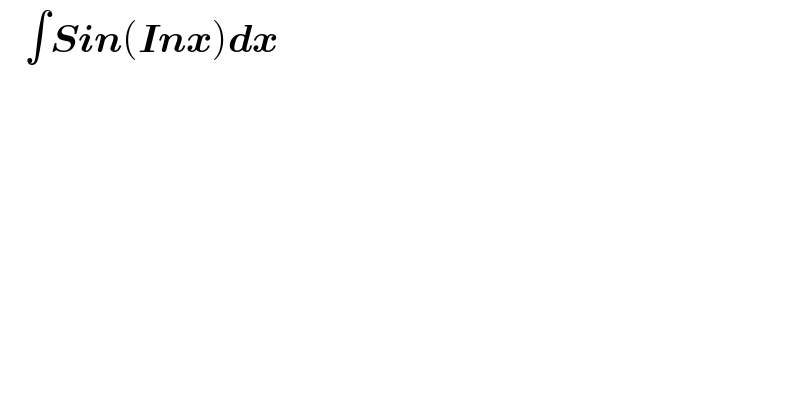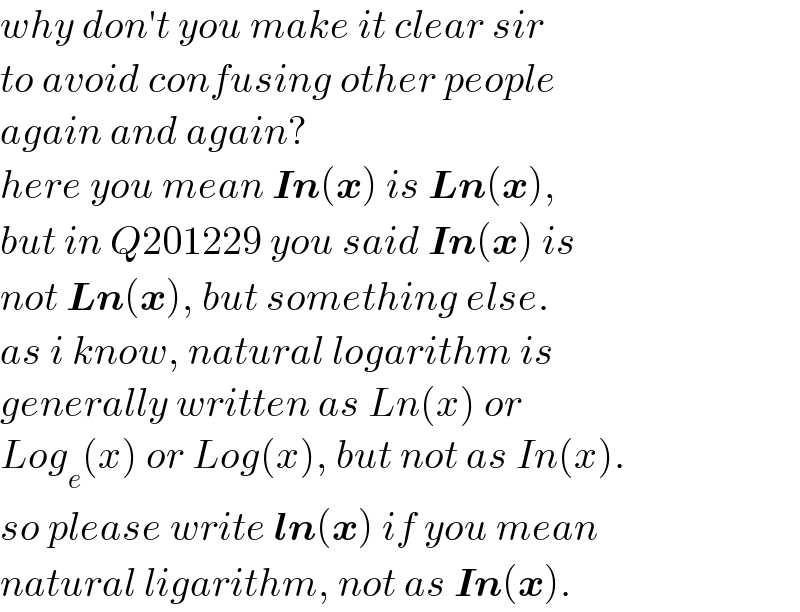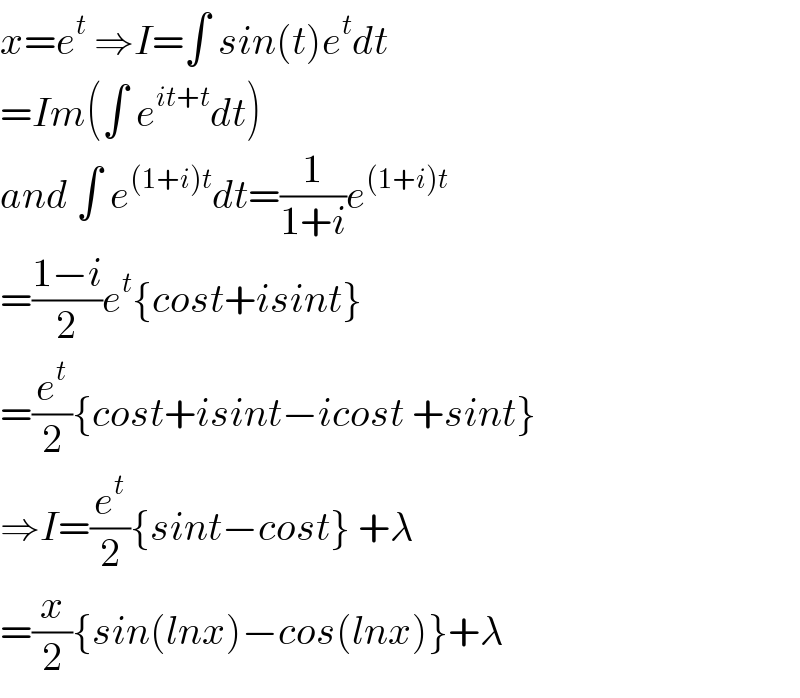
Question Number 201546 by Calculusboy last updated on 08/Dec/23

$$\:\:\:\int\boldsymbol{{Sin}}\left(\boldsymbol{{Inx}}\right)\boldsymbol{{dx}} \\ $$
Commented by aleks041103 last updated on 09/Dec/23

$${is}\:{this}\:{sine}\:{of}\:{natural}\:{log}\:{of}\:{x}\:{or}\:{sth}\:{else}? \\ $$
Commented by Calculusboy last updated on 09/Dec/23

$$\boldsymbol{{yes}}\:\boldsymbol{{it}}\:\boldsymbol{{is}}\:\boldsymbol{{sine}}\:\boldsymbol{{of}}\:\boldsymbol{{natural}}\:\boldsymbol{{log}}\:\boldsymbol{{of}}\:\boldsymbol{{x}} \\ $$
Commented by mr W last updated on 09/Dec/23

$${why}\:{don}'{t}\:{you}\:{make}\:{it}\:{clear}\:{sir} \\ $$$${to}\:{avoid}\:{confusing}\:{other}\:{people} \\ $$$${again}\:{and}\:{again}? \\ $$$${here}\:{you}\:{mean}\:\boldsymbol{{In}}\left(\boldsymbol{{x}}\right)\:{is}\:\boldsymbol{{Ln}}\left(\boldsymbol{{x}}\right), \\ $$$${but}\:{in}\:{Q}\mathrm{201229}\:{you}\:{said}\:\boldsymbol{{In}}\left(\boldsymbol{{x}}\right)\:{is} \\ $$$${not}\:\boldsymbol{{Ln}}\left(\boldsymbol{{x}}\right),\:{but}\:{something}\:{else}. \\ $$$${as}\:{i}\:{know},\:{natural}\:{logarithm}\:{is} \\ $$$${generally}\:{written}\:{as}\:{Ln}\left({x}\right)\:{or} \\ $$$${Log}_{{e}} \left({x}\right)\:{or}\:{Log}\left({x}\right),\:{but}\:{not}\:{as}\:{In}\left({x}\right). \\ $$$${so}\:{please}\:{write}\:\boldsymbol{{ln}}\left(\boldsymbol{{x}}\right)\:{if}\:{you}\:{mean} \\ $$$${natural}\:{ligarithm},\:{not}\:{as}\:\boldsymbol{{In}}\left(\boldsymbol{{x}}\right). \\ $$
Commented by Calculusboy last updated on 09/Dec/23

$$\boldsymbol{{okay}},\boldsymbol{{am}}\:\boldsymbol{{sorry}}\:\boldsymbol{{for}}\:\boldsymbol{{confusing}} \\ $$
Answered by Mathspace last updated on 09/Dec/23

$${x}={e}^{{t}} \:\Rightarrow{I}=\int\:{sin}\left({t}\right){e}^{{t}} {dt} \\ $$$$={Im}\left(\int\:{e}^{{it}+{t}} {dt}\right) \\ $$$${and}\:\int\:{e}^{\left(\mathrm{1}+{i}\right){t}} {dt}=\frac{\mathrm{1}}{\mathrm{1}+{i}}{e}^{\left(\mathrm{1}+{i}\right){t}} \\ $$$$=\frac{\mathrm{1}−{i}}{\mathrm{2}}{e}^{{t}} \left\{{cost}+{isint}\right\} \\ $$$$=\frac{{e}^{{t}} }{\mathrm{2}}\left\{{cost}+{isint}−{icost}\:+{sint}\right\} \\ $$$$\Rightarrow{I}=\frac{{e}^{{t}} }{\mathrm{2}}\left\{{sint}−{cost}\right\}\:+\lambda \\ $$$$=\frac{{x}}{\mathrm{2}}\left\{{sin}\left({lnx}\right)−{cos}\left({lnx}\right)\right\}+\lambda \\ $$
Answered by JDamian last updated on 09/Dec/23

$${Calculusboy}\:{definitely}\:\:{cannot}\:{differentiate} \\ $$$${a}\:{lowercase}\:{L}\:{from}\:{an}\:{uppercase}\:{I}. \\ $$
Commented by Calculusboy last updated on 09/Dec/23

$$\boldsymbol{{i}}\:\boldsymbol{{know}}\:\boldsymbol{{the}}\:\boldsymbol{{difference}},\boldsymbol{{i}}\:\boldsymbol{{just}}\:\boldsymbol{{mistype}}\:\boldsymbol{{it}}\:\boldsymbol{{when}}\:\boldsymbol{{i}}\: \\ $$$$\boldsymbol{{want}}\:\boldsymbol{{to}}\:\boldsymbol{{post}}\:\boldsymbol{{it}} \\ $$
